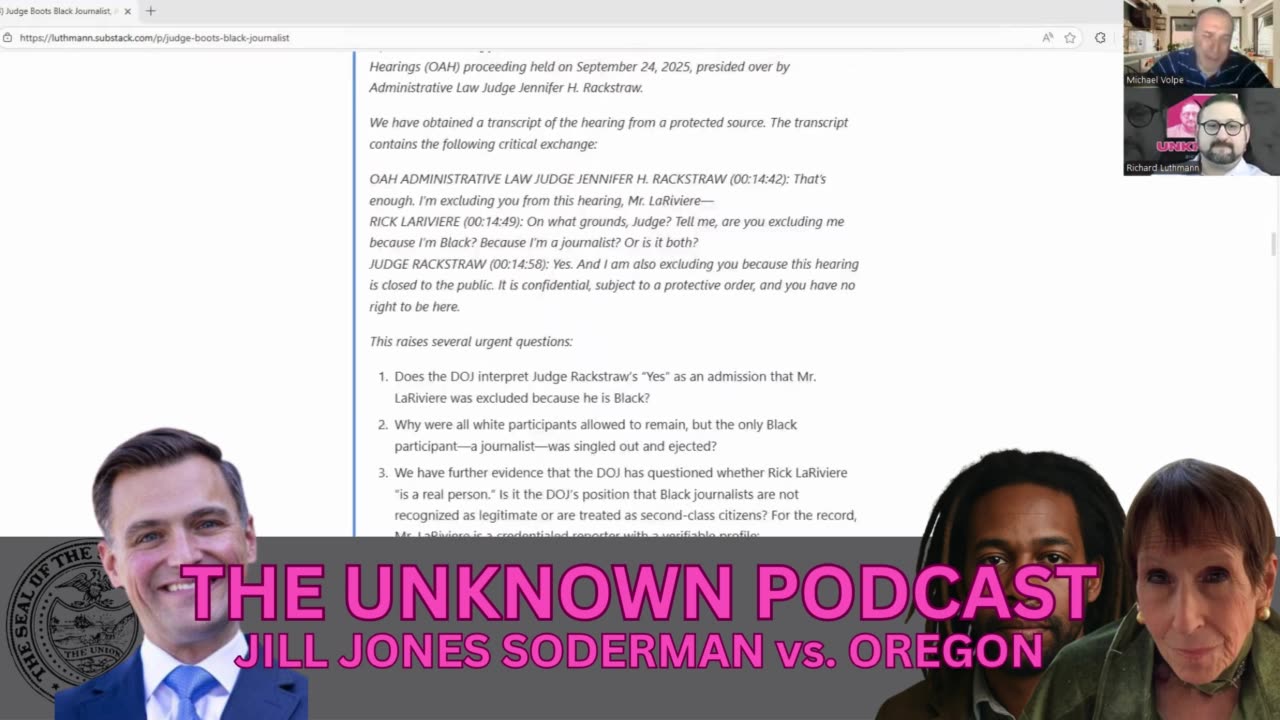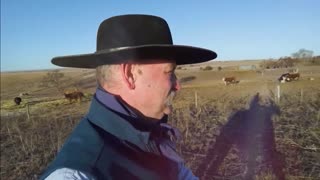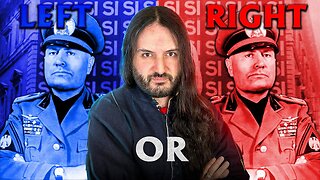Premium Only Content

Oregon Board’s Free Speech Debacle: Rosh Hashanah Ambush and Racial Exclusion Fight
In September 2025, Oregon regulators targeted family-court watchdog Jill Jones-Soderman. State officials sent her a hearing notice and over 200 pages of legal documents on the eve of Rosh Hashanah. Jones-Soderman, who heads the Foundation for the Child Victims of the Family Courts, had written letters criticizing judicial abuse. Officials accused her of the unauthorized practice of law and psychology. She called the timing “unconscionable.” Advocates said the move aimed to silence her. The agency sought summary determination without a hearing. When she requested more time, officials refused, insisting the proceeding would continue. Supporters said she was punished for exercising her right to petition.
During a September 24 telephonic hearing, Black investigative journalist Rick LaRivière joined to report on the case. Administrative Law Judge Jennifer Rackstraw ordered him to leave. When he asked if he was being excluded because he was Black or a journalist, she replied, “Yes. And I am also excluding you because this hearing is closed to the public.” LaRivière demanded a written order and refused to hang up. The judge postponed the hearing rather than allow press access. Jones-Soderman refused to consent to secrecy, calling the proceeding a “Star Chamber” built on twisted evidence. She vowed to appeal any attempt to silence her. Observers said the episode showed Oregon’s administrative courts prefer secrecy to constitutional rights.
The dispute cuts to the core of First Amendment protections. In NAACP v. Button (1963), the U.S. Supreme Court ruled that litigation and advocacy are protected political expression. California Motor Transport Co. v. Trucking Unlimited (1972) affirmed citizens’ right to petition all branches of government, including agencies. Oregon’s action treats a watchdog letter as unlicensed professional conduct. Closing the hearing raised serious press-freedom and equal-protection concerns. Jones-Soderman is not an attorney or psychologist but a qualified family-court expert witness. Critics say officials punished her speech to shield insiders. The case also implicates antitrust law. In North Carolina Board of Dental Examiners v. FTC (2015), the Court ruled licensing boards dominated by practitioners lose state-action immunity without active supervision. If Oregon’s Board of Psychology acted independently to suppress speech, its members could face personal liability.
-
 1:31:26
1:31:26
Game On!
16 hours ago $2.47 earnedIt Was ALWAYS A Shedeur Thing! NFL Week 12 RECAP!
16K4 -
 11:55
11:55
Upper Echelon Gamers
15 hours ago $7.19 earnedThe Malware Disaster on STEAM
24.1K2 -
 25:35
25:35
Athlete & Artist Show
17 hours ago $2.19 earnedYOU WON'T FINISH THE GAME!
17.5K -
 13:22
13:22
Silver Dragons
19 hours agoAre You Prepared for What SILVER Will Do Next?
19.4K3 -
 9:20
9:20
Adam Does Movies
21 hours ago $2.65 earnedIT: Welcome To Derry Episode 4 Recap - What An Eyesore
18.2K1 -
 1:30:15
1:30:15
LIVE WITH CHRIS'WORLD
13 hours agoTHE WAKE UP CALL - 11/24/2025 - Episode 12
16.3K6 -
 2:05:00
2:05:00
BEK TV
3 days agoTrent Loos in the Morning - 11/24/2025
12.4K -
 LIVE
LIVE
The Bubba Army
2 days agoF1'S NEWEST DRIVER? - Bubba the Love Sponge® Show | 11/24/25
729 watching -
 19:15
19:15
Nikko Ortiz
22 hours agoOstrich Gets A Taste For Human Blood
69.3K17 -
 32:42
32:42
MetatronHistory
1 day agoWas FASCISM Left wing or Right wing?
22.1K47